Product Recycling
To expand the resource reuse and recycling loop, Epson collaborate with customers, industries, and regions to promote the collecting and recycling of used products in various countries and regions around the world.
Global Activities Overview
Epson's Global Collection and Recycling Systems
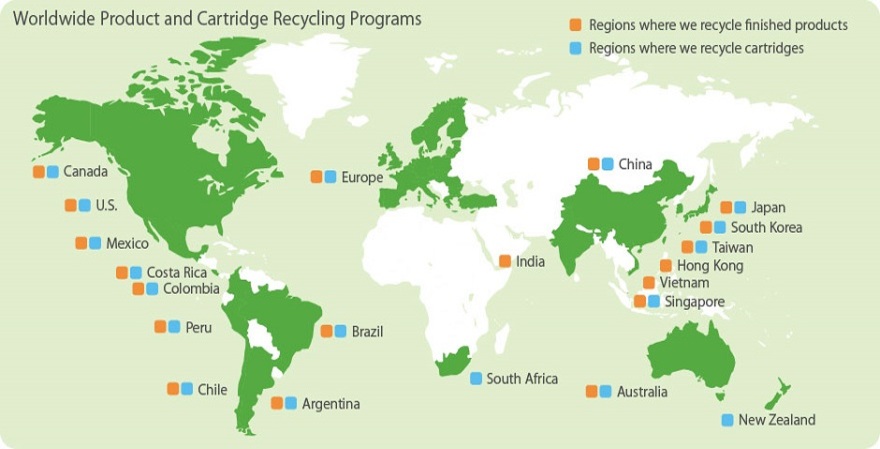
Collection and recycling programs for imaging equipment:
(Links to Country/Region Sites)
Collection and recycling programs for cartridges:
(Links to Country/Region Sites)
Collection Trends for Products and Cartridges
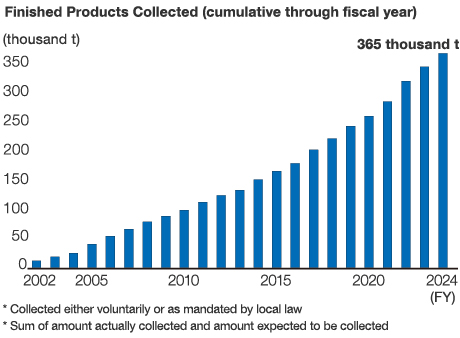
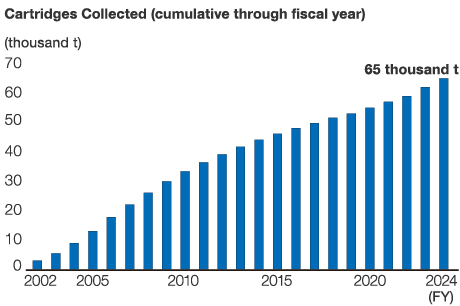
Initiatives in Each Region
Europe
[Finished Products]
The European WEEE (waste electrical and electronic equipment) directive has been effective since 2005, and has been reflected in national legislation. To comply with the European WEEE directive, Epson is building recycling systems in each country. Moreover, Epson implements environmentally-conscious design in response to the WEEE directive 2012, that requires manufacturers to increase recyclability of products. Epson also acts quickly to comply with similar legislation that is expected to be adopted in EMEA1 nations that are not EU member states.
1 Europe, the Middle East and Africa
[Cartridges]
Epson Europe B.V. (EEB) is building a collection and recycling system for cartridges while monitoring customer needs and legislative trends. In 2013, EEB rebuilt the system to provide customers with more collection options and to increase recycling efficiency.
■ Postal Collections
Customers request empty pre-printed envelopes, and return filled envelopes via post for consumer inkjet and LabelWorks cartridges. Customers simply request and attach a return label, and return up to ten cartridges in a package.

■ Epson Express Center
Customers return consumer inkjet, laser printer, and LabelWorks cartridges to the nearest Epson Express Center.
■ Box Collections
After customers go online and sign up to the program they receive a collection box for large format printer and laser printer (more than 10) cartridges. When the box is full, it will be collected by the recycling company.
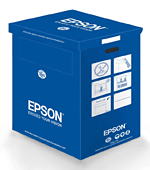
Americas
[Finished Products]
In Canada and the United States, some states are seeking to introduce laws requiring manufacturers to collect and recycle products. In the U.S., Epson America, Inc. (EAI) has run a voluntary take back program since 2002.
In addition to the recycling program, EAI and the National Cristina Foundation have joined together with the goal of helping those who are facing economic challenges or have disabilities gain access to the technology of today.

In Brazil, the National Solid Waste Policy (PNRS) was launched in 2010, requiring the electronics industry to implement reverse logistics. Epson do Brasil Industria e Comercio, Ltda. (EDB) implemented a Collection Program for disposing of used products and consumables. The Collection Program operates throughout Brazil, with more than 100 collection points countrywide. Products and supplies collected are sent to an approved recycler who disassembles and then sends the item to recycling and/or co-processing1 as required.
1 Use of waste to replace new resources and fossil fuels.

[Cartridges]
In the U.S. and Canada, EAI has created a mail-based recycling program for ink cartridges. In the U.S., customers can return toner cartridges by attaching an electronic return label printed from a website.
Asia
[Finished Products]
In India, Epson India Pvt. Ltd. works on promoting recycling program by making an original logo under the India e-waste (Management and Handling) Rules, 2011 Directives.
In Taiwan, Epson Taiwan Technology & Trading Ltd. complies with the Resource Recycling Act.
In South Korea, Epson Korea Co., Ltd. (EKL) is part of the E-Cycle Governance and comply with laws related to resource conservation and recycling promotion, as well as the Resource Circulation Act for Electrical and Electronic Products, which came into effect in January 2008.

[Cartridges]
In Taiwan, Epson Taiwan Technology & Trading Ltd. set up a system in 2001 using a toll-free number and a website to accept collection requests directly from customers to facilitate on the-spot collection.
In Singapore in 2012, Epson Singapore Pte. Ltd. joined with Canon Inc. to cooperate with the Singapore National Environment Agency and National Library Board to begin promoting The Homecoming Project to collect ink and toner cartridges. Under the program, consumers can deposit ink and toner cartridges from any manufacturer in collection boxes installed in 21 branches of the national library.
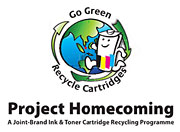
Oceania
[Finished Products]
Epson Australia Pty. Ltd. (EAL) partners with ANZRP (Australia & New Zealand Recycling Program), a not-for-profit organization that operates the TechCollect program. This program offers a free service for the general public and small businesses to drop off their e-waste for responsible recycling, as part of the National TV and Computer Recycling Scheme, regulated under the Recycling and Waste Reduction Act.

[Cartridges]
EAL participates in the Cartridges 4 Planet Ark program. EAL is a founding member of this promotion to recycle ink cartridges and toner cartridges. The aim of the program is to prevent cartridges from entering the waste stream and thereby reduce the potential environmental impact arising from the end of life disposal of cartridges.

[Lamps]
EAL has in place a projector lamp recycling program whereby used projector lamps are recycled, and EAL will recycle any brand lamps - not just Epson. Approximately 95% of the weight of the lamp is recycled.
Japan
[Product Recycling]
Under the Japanese Home Appliance Recycling Law, Epson collects and recycles used home computers. Since 1999, Epson has also been collecting and recycling used information equipment from businesses.
[cartridge collection and recycling].
To enhance customer convenience, we offer a variety of collection systems. In addition, by having Epson MISUBE Corporation perform the sorting and pre-recycling of cartridges, we aim to secure workplaces for people with disabilities and create jobs by increasing the volume of cartridges collected.
■ Collection and Recycling Program
We offer a service in which a designated contractor picks up used cartridges from customers (individuals and corporations) who use a large number of cartridges. Through this program, we donate to environmental preservation organizations.
■ The Bellmark Program
Since 2005, Epson has been participating in the Bellmark Program by collecting used printer cartridges. Schools that participate in the program earn Bellmark points based on the number of used cartridges they collect. This program not only helps to conserve the global environment by reducing waste and making effective use of resources, but it also enables Epson to contribute to society by providing educational support.
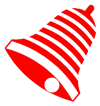
■ Collection activities at domestic bases
Epson has been collecting Bell Marks since October 2011 with the aim of further expanding support for the Bell Mark movement. collection box have been installed at all Epson domestic bases, and collection is carried out from employees, suppliers, and local residents. The collected items are recycled, and Bell Mark points are awarded according to the amount collected. The points are donated to the Bell Mark Education Support Foundation, local schools at each base, and schools affected by disasters such as earthquakes, windstorms, and floods, including the Great East Japan Earthquake, to help support schools.
The results of our activities in fiscal 2024 were 67,165 points.

[Finished Products]
Since 2003 Japan has legally required producers to collect and recycle unwanted computers from individuals and as businesses. In 1999, Epson launched a voluntary program to collect and recycle other Epson-brand waste electrical and electronic equipment (WEEE) also, such as printers, scanners, and projectors, from businesses ahead of the enforcement of applicable laws.
[Cartridges]
Epson has built various cartridge collection schemes while monitoring customer needs. In addition to being good for the environment, Epson's cartridge recycling program provides employment to persons with disabilities at Epson Mizube Corporation, a special subsidiary to support the employment of disabled individuals within the Epson Group.
■ Take-Back Service
Epson has set up a collection service for customers who consume large numbers of cartridges. As part of this service Epson makes donations to
environmental conservation organization.
■ Bellmark Program
Epson has participated in the Bellmark program since 2005. In addition to reducing wastes and helping to preserve the environment, the Bellmark program supports participating schools by awarding them points for ink cartridges collected. Schools use these points to purchase educational materials and equipment.

■ Cartridge Collection Program at Epson Sites in Japan
In 2011, Epson started collecting used ink cartridges at Epson Group sites in Japan to increase its aid to the Bellmark program. Collection boxes have been installed at every Epson business site to collect cartridges from employees, business partners, and members of the community. The collected cartridges are recycled, and Bellmark points are granted based on the number of cartridges collected. The points are then donated to the Bellmark Educational Support Foundation, local schools, or schools that were damaged by natural disasters. The results of our activities in fiscal 2024 were 67,165 points.

■ Ink Cartridge Satogaeri (Homecoming) Project
Printer manufacturers in Japan joined forces in 2008 to form the Ink Cartridge Satogaeri (Homecoming) Project, a program that uses approximately 3,600 post offices and local governments across Japan to collect used ink cartridges.
The project has donated to environmental protection organizations, allowing customers to indirectly participate in social contribution activities.

■ Joint Environmental Program
In April 2012, Epson and Catalina Marketing Corporation launched an environmental program where used ink cartridges from coupon printers are collected and refilled. Under the program, Epson collects used ink cartridges from nearly 30,000 inkjet coupon printers installed in retail stores across Japan. Epson then refurbishes and refills the cartridges for reuse at the stores. Except for the label, almost all parts of the cartridge are reused and product quality is managed just as it is for new cartridges.




